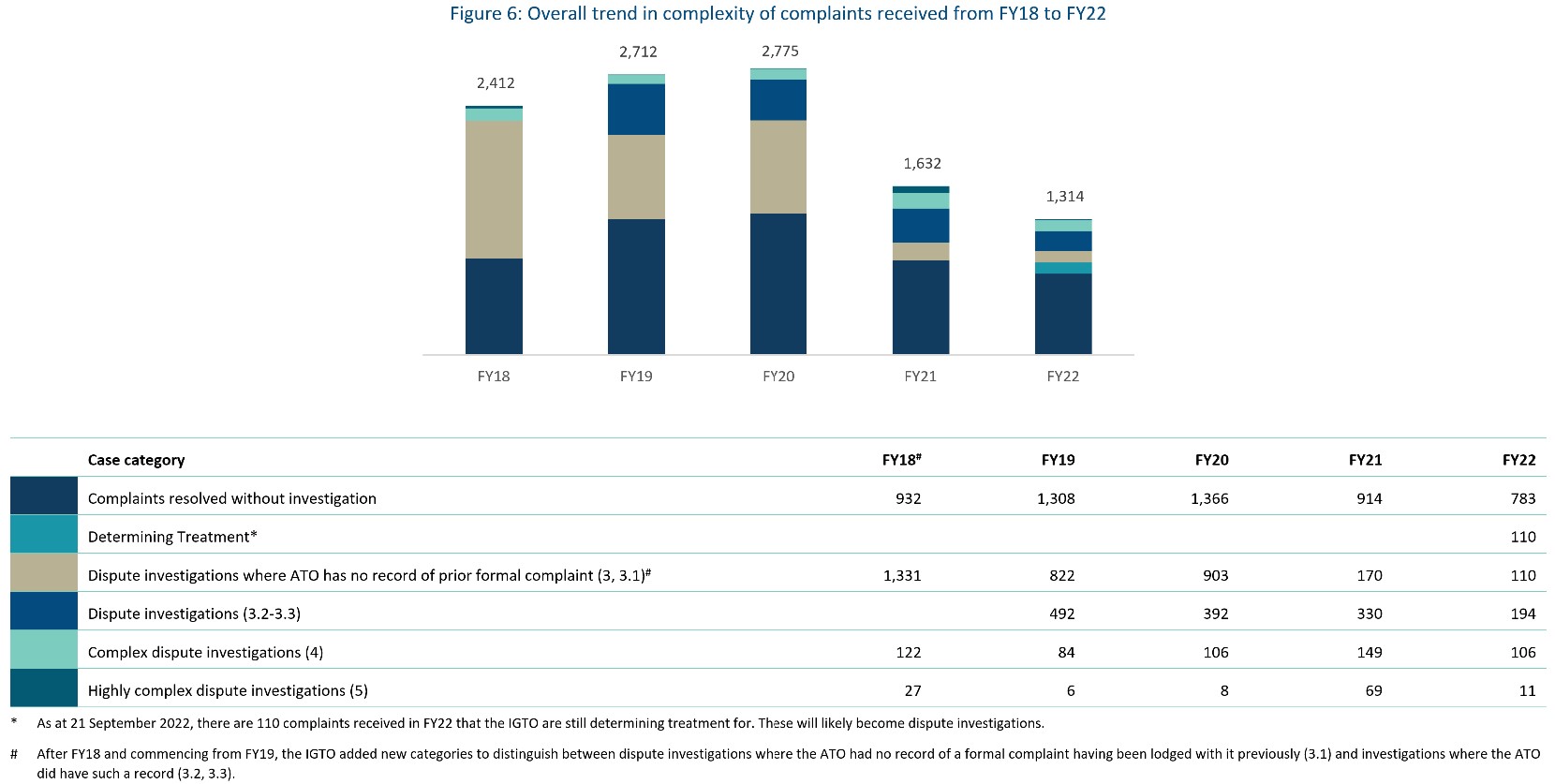Karen Payne, the Inspector General of Taxation and Taxation Ombudsman has released the FY22 Annual Report. “I am pleased to announce that the Annual Report for the Office of the Inspector-General of Taxation and Taxation Ombudsman (IGTO) is now available[1]The Annual Report was tabled in the Australian Parliament by the Assistant Treasurer and Minister for Financial Services the Hon. Stephen Jones MP on Thursday 27 October 2022.. The report includes details on our performance and achievements during the financial year ended 30 June 2022 (FY22) and reports. It also provides an accountability overview detailing the ways in which we have assisted the community and helped to improve taxation administration in Australia.”
“The Australian community expects and benefits from a tax system that is administered fairly, equitably and transparently … since people are more willing to engage with the system where they trust in its integrity.” – Karen Payne
Improving the effectiveness and efficiency of resolving taxation complaints for the community is a core objective and concern for IGTO.
IGTO Commitment
The IGTO is committed to independent assurance and investigation of the taxation actions and decisions in complaints and disputes that are raised with us by the community. Best practice dictates that an effective complaint management system incorporates three levels of complaint management.[2]AS10002:2022 – Guidelines for complaint management in organizations – Appendix H – Three level model of complaint handling.

An ombudsman service provides an independent external investigation service. As such it is rated as a Level 3 dispute resolution body under the Australian complaints management standard[3]AS10002:2022 – Guidelines for complaint management in organizations..
“We understand that complainants that approach us have previously been unsuccessful in resolving their complaint directly with the Australian Taxation Office (ATO) or Tax Practitioners Board (TPB). They may be frustrated, fatigued, or confused about their experience and why they have been unsuccessful before lodging their complaint with us,” said Karen Payne. “We aim to provide a reference point and channel of support for them.”
How did we perform?
Our Performance Report is set out in Part 2 and measures our performance against Key Performance Areas and Indicators from our Corporate Plan for FY22. This includes eight case studies which help to illustrate the taxation issues investigated and results as part of our dispute investigation service. Our strategic priorities and key activities for FY23 and beyond are set out in our latest Corporate Plan FY23-26, which can be accessed here.
Taxation Disputes
In FY22, we received 1,314 complaints and closed 90% (1,187) within the same period. We had 381 dispute investigations on hand (that is, still in progress) as at 30 June 2022.

The final category for these cases may change as the investigation progresses. The trend in our complaint mix is set out in Figure 6 (extracted below).

The majority of complaints received (70%) were from self-represented individuals. The remaining complaints came from self-represented businesses (16%), individuals represented by another party, for example a tax practitioner, lawyer, family member or friend (8%) and represented businesses (6%).
The top 5 complaint issues in FY22 related to:
- Payments to the taxpayer 344 cases
- Lodgement and processing 215 cases
- Debt collection 175 cases
- Registration/taxpayer details 86 cases
- Communication issues 79 cases
The feedback we received from our complaint surveys demonstrates similar levels of satisfaction compared to our FY21 result. In FY22, 69% of survey respondents reported overall satisfaction with our Dispute Investigation Service, 51% reported overall satisfaction with the outcome of their result, and 86% reported satisfaction with the professionalism of our staff.
Review Investigations
The IGTO commenced the following three review investigations to investigate actions, systems and taxation laws regarding tax administration matters and to identify improvement opportunities:
- the Australian Taxation Office’s administration and management of objections;
- the exercise of the Commissioner’s general powers of administration; and
- the exercise of the Commissioner’s remedial powers.
The IGTO’s report into the effectiveness of ATO communications of taxpayers’ rights to complain, review and appeal was published on 14 October 2021. It made six recommendations comprising 11 parts to the ATO. The ATO agreed in full with ten out of 11 parts and agreed in principle with the remaining part.
Stakeholder and Community Engagement
We continued to engage regularly with stakeholders throughout FY22, despite the challenges posed by the COVID-19 pandemic. This includes industry and professional presentations and webinars, attending tax discussion groups, University and Tax Clinic presentations. We attended 62 such meetings including conferences and forums, stakeholder discussion groups, or workshops.
The IGTO’s role is to build the community’s confidence and trust in the taxation system. We continue to contribute to and foster integrity within the tax system, which supports voluntary compliance, an essential feature in a self-assessment tax system.
Karen Payne – Inspector-General of Taxation and Taxation Ombudsman
31 October 2022
For further information – Contact
Marjorie Johnston – Wordmakers
Mobile: 0407 329 430
About the IGTO
The IGTO is an independent, Commonwealth statutory agency, established in 2003 and operating out of a single office location in Sydney but with national responsibilities and obligations. The Taxation Ombudsman function was transferred to the IGTO in 2015. The IGTO contributes to the overall integrity and transparency of the tax system, by independently investigating taxation administrative decisions, actions, systems and laws of the ATO and the TPB.
References
| ↑1 | The Annual Report was tabled in the Australian Parliament by the Assistant Treasurer and Minister for Financial Services the Hon. Stephen Jones MP on Thursday 27 October 2022. |
|---|---|
| ↑2 | AS10002:2022 – Guidelines for complaint management in organizations – Appendix H – Three level model of complaint handling. |
| ↑3 | AS10002:2022 – Guidelines for complaint management in organizations. |

